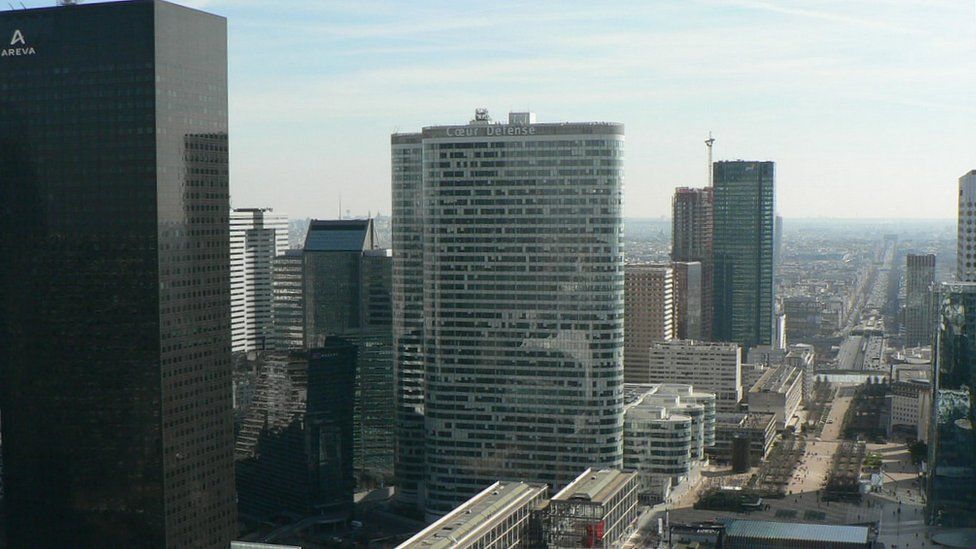Paris turns charm on post-Brexit City of London
- Published

Three months after the Brexit vote, the Financial Markets Authority (AMF) - France's financial regulator - is receiving a steady stream of enquiries from London-based companies about the possibilities of relocation.
"It was quiet in July and August. But since the start of September, I've been taken by surprise by the number of calls we are getting," says AMF secretary-general Benoit de Juvigny.
"What they hate most, these businesses, is uncertainty. No-one can tell them what Brexit will look like. So more of them are looking to keep their options open by having an operation on the continent."
Brexit is an opportunity that Paris financial operators say they wish they had never had.
To a man or woman, they were for the UK remaining in the EU - if only to help spread the free-market spirit.
But now that Brexit is coming, they would be mugs not to make the most of it.
A charm offensive is under way to lure from London as much financial business as possible - and to tempt back some of the tens of thousands of French expats who left to work there.
The Socialist government is on board, promising tax breaks for returnees, lower company rates and more international schools.
But the bulk of the work is being done by the financial industry itself, with teams of lobbyists visiting London to push the advantages of the French capital and to dispel misconceptions.
Agility first
The central argument is that Brexit will lead to an end to so-called "passporting" - in other words, the possibility for a London-certificated business to sell its services across the 27 remaining EU members.
No-one knows if London firms will indeed lose their passports - the negotiations are not even close to starting - but in a way, that is the point.
As long as there is uncertainty, UK-based financial institutions may decide they need a base in Europe, in order to be sure to retain the access they now enjoy as a right.
At the AMF, they sense the appeal of their case, so to drive the point home, they have just made it easier for UK firms to apply for a French right to operate.
Under their two-week ticket, institutions currently regulated by the UK's Financial Conduct Authority (FCA) can get a fast-track "pre-authorisation" to open for business in Paris.
After that, under the AMF's agility programme, the UK firm will be accompanied through the rest of the process by an English-speaking official with the aim of being fully certificated after two months.
The responsiveness of the French regulator is one of the changes - Paris advocates say - which will surprise newcomers.
"There has been a cultural revolution in Paris," says Alain Clot, head of Fintech France, which represents start-ups in digital finance.
"Today the French regulator talks to the entrepreneur at a very early stage. It helps them to fine-tune their start-ups. It accepts the idea of proportionality - which means it doesn't enforce the same rules for €1,000 (£875) as it does for €100,000.
"All this is very new and very important for people who need a human face in front of them when they start their business in the financial sector."
No more mistrust
For Mr Clot, Fintech - the fast-growing world of internet-based finance - is the area where London is most likely to lose business to Paris and other European centres.
Until now, most Fintech start-ups have chosen London, because of its looser regulatory system.
But with the improving regime in Paris, with easier access there to venture capital and other sources of finance - and above all with the risk of losing passporting rights once Brexit kicks in - there is now a strong case for pulling out of London.
"Relocating a bank can take a century. Relocating a start-up takes a few clicks," says Mr Clot.
But what, say the doubters, of France's notorious mistrust of money? Was it not the President himself - Francois Hollande - who said that the only enemy he had was the "world of finance"?
The world has changed, is the answer from Arnaud de Bresson, chief executive of Paris Europlace, which promotes Paris as a financial centre.
"Twenty years ago I gave an interview to a journalist from the Financial Times, who said exactly that: that Paris could never be a financial centre. I said, just wait. And now look at us."
Today Paris is indeed a major financial centre, helped by a large number of global companies, a growing capital market culture and high competence levels in data science.
Among the minuses are a tax regime that scares away high-earners, rigid hire-and-fire rules and an absence of pension funds.
So far, Paris has acted nimbly to take advantage of London's discomfort. No-one expects it to seriously challenge the UK capital. But a certain "rebalancing", to use Alain Crot's term, may well be on the horizon.
- Published28 June 2016
- Published22 July 2016